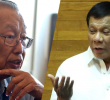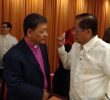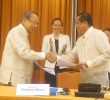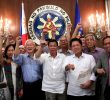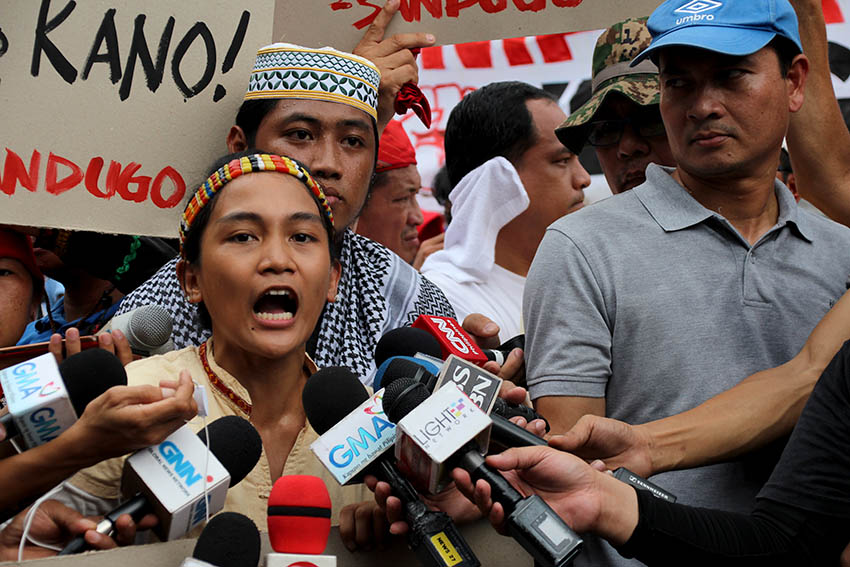
Piya Macliing Malayao of Katribu Partylist.
PHOTO: PAULO RIZAL / DAVAOTODAY.COM FILE PHOTO
ROME, Italy – A local indigenous people’s group in the Philippines expressed its support to the program of the National Democratic Front of the Philippines for the indigenous peoples.
The Katribu or Kalipunan ng Katutubong Mamamayan ng Pilipinas said they are recommending for the government to forge an agreement with the NDF based on their draft program for indigenous peoples.
Based on the NDFP’s draft of the CASER on February 26, 1998, it blames “imperialism, the industrial backwardness and agrarian character of the Philippine economy and the consequent grossly iniquitous social and economic relations and massive poverty” as the cause of the armed conflict that spans for more than four decades.
The NDFP also believes that to bring about a self-reliant and all-round social and economic development there is a need to “uphold economic sovereignty and independence against foreign monopoly capitalism.”
It also said there is a need to “recover, conserve and defend the national patrimony, protect the environment, carry out national industrialization and land reform.”
Peace panels from both the government of the Philippines and the NDFP are travelling on their way here for the third round of the peace talks which will discuss the comprehensive agreement on social and economic reforms and other substantive agenda. The talks will be held from Jan. 19 to 25.
“The NDFP program has been well-received and consulted thoroughly with the indigenous communities,” said Pya Macliing Malayao, Katribu secretary general.
Malayao said from the beginning of the resumption of the peace process indigenous groups and communities are involved through the “Indigenous People’s Agenda.” She said they have submitted the agenda to both parties as early as July in 2016.
She said the IP Agenda includes :calls for the immediate cessation of military operations and pull out of military troops in indigenous communities; halt of destructive mining and resource plunder in ancestral lands; respect for their right to free, prior and informed consent (FPIC) and full recognition of their right to self-determination.”
“The NDFP reciprocated by absorbing our proposals but the GRP has yet to draft a concrete program based on our legitimate concerns,” she said.
Malayao said they have conducted consultation, dialogues and protest actions.
The Lakbayan ng Pambansang Minorya, a national caravan participated by more than 2,300 Moro and indigenous peoples even figured prominently on the news after scores of activists and police were hurt after a clash in front of the US Embassy in Manila.
IP Advisory Council
For his part, Presidential Peace Adviser on the Peace Process Jesus Dureza said an advisory council consisting of indigenous peoples groups in provinces will aid the peace process in tackling various IP concerns.
“You understand your situations the best; therefore, you are also the ones who can suggest the best solutions. But for this to happen, you also need to come together as one,” Dureza told members of IP groups in a forum held in Midsayap, North Cotabato on January 3.
Dureza said the advisory council is expected to “provide voices and assure key roles for the so-called “national minorities” in the peace negotiations with the National Democratic Front and the implementation of Bangsamoro agreements with the Moro fronts.”
He said this will ensure an inclusive and transparent peace process.
“We cannot solve your problems for you because we do not know what your problems are. That is why there is a need for you to sit down and discuss them and the possible solutions,” he said.
Dureza also assured the indigenous groups of their representative in the new and expanded Bangsamoro Transition Commission (BTC), which will draft the enabling law for the implementation of all Bangsamoro peace deals and other pertinent measures including the Indigenous Peoples Rights Act of 1997.
The Communist Party of the Philippines wages what is now dubbed as the longest running Communist insurgency in Asia. (davaotoday.com)

